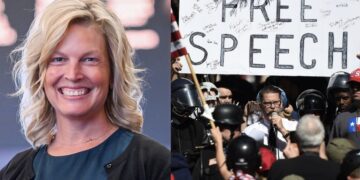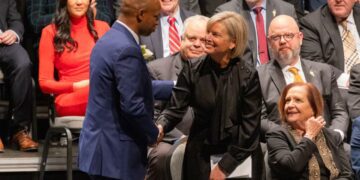By Hank Beckman -
The verdict is in on the first presidential debate, and it’s almost unanimous: it was a disheartening spectacle unworthy of aspirants to be leaders of the greatest nation in history.
From both sides of the aisle, our opinion-makers in politics and media are in agreement that the back and forth between Donald Trump and Joe Biden signals a new low in our national conversation.
Supporters of Biden are simply shocked that the President came out swinging, using one of his frequent interruptions to stoop so low as to bring up Hunter Biden’s apparently shady business dealings. How rude!
Some have even suggested that future debates be cancelled, claiming that to continue with them would legitimize Trump’s approach to the format.
The New York Times headline posed a somber question: “Should the Presidential Debates Be Cancelled,” describing the first one as a “circus of sound and fury.” The Washington Post had a ready answer in its own headline: “Cancel The Remaining Debates. We Can’t Have a Repeat of the First One.” And Christina Cauterucci from Slate said that Trump spent the time “lying, interrupting, being racist and making snide asides.”
Please. Spare us your pearl-clutching about the President’s aggressive approach tarnishing a tradition that a relatively few elite pundits and political operatives maintain is a sacred rite of passage in American presidential politics.
It’s more accurate to say that Wednesday’s cage match was a refreshing departure from what, in reality, have historically been scripted press conferences that produce nothing more than a surface understanding of the issues and precious little information that voters cannot obtain reading the candidate’s press releases.
The real objective is to jumpstart endless media babble, sell papers and gin up ratings/click-bait explaining the impression candidates made on the average voter. And what the talking heads really mean is the impressions they want the average voter to take away from the debate. (It always amazed my late father that news reporters would try to tell viewers what the president just said. “I just heard what he said!”)
In 60 years of televised presidential debates can it honestly be said that there have been that many of these glorified pageants that have been crucial to the outcome of the race? And if they were, was it because the event actually informed us about the policies of the candidate, or just something about their appearance or personality?
In the first Kennedy-Nixon debate, the only one of the four that anyone cares about, the historical consensus is that the candidates were about even on the issues, but Kennedy came off better because of his relaxed demeanor, enhanced by a fresh suntan.
Nixon looked drawn and haggard from a recent illness and the fact that he refused to use makeup made him look pale and sickly next to the handsome Kennedy.
There were no presidential debates for the next three elections, and when they resumed in 1976, Gerald Ford did produce a what-the-hell-did-he-just-say type moment when he claimed that there was no Soviet domination of eastern Europe. But aside from that, there really wasn’t anything memorable about the night.
In 1984, Reagan looked flustered and at times confused in his first debate with Walter Mondale, but was his old charismatic self in the second, easily besting Mondale with his trademark humor and good nature.
The debates between Bill Clinton and George Bush 41 are little remembered for any substance. Bush 43 and Al Gore were cures for insomnia, as were W’s later debates with John Kerry. Does anyone remember any exchange between Barack Obama and John McCain?
It wasn’t until Trump squared off with Hillary Clinton that we started to get a glimpse of one of the candidates as an actual human being, instead of an actor reciting poll-tested cliches designed to appeal to a particular demographic.
For all the blathering from Kennedy wannabes about how his spectacular looks turned the campaign in his favor, most who heard the debate on radio thought Nixon outpointed him; if the campaign had lasted another week, Nixon would certainly have won. It was only because President Eisenhower delayed his entry into the campaign that Kennedy pulled out a squeaker.
Some maintain that Gerald Ford’s gaffe on Eastern Europe cost him the election to Carter, but just as damaging to his campaign was the public fallout from pardoning Nixon for any Watergate-related crimes.
Bill Clinton took a lead over Bush 41 right out of the conventions and never really relinquished it, no matter how the pundits judged the debates. In one debate Bush was caught repeatedly looking at his watch like he was late for a dinner at a Yale reunion, but it didn’t really matter. After 12 years of Republican administrations, the country was ready for a change.
The debates in this century haven’t played a significant role in deciding any of the presidential elections. In fact, Hillary Clinton was judged by most observers to have easily bested Donald Trump in 2016, but that wasn’t enough to make her the first woman in the White House.
At best, there is only one instance where a presidential debate clearly proved to be crucial in the outcome of the election—Ronald Reagan’s victory over Jimmy Carter in 1980.
The debate was the only showdown between the two and came late in the campaign, the week before the election. Many polls had Carter in the lead in the final weeks, thanks to his portrayal of Reagan as an extremist who would take grandma’s Social Security away and start the third world war, given his lifelong enmity to the Soviet Union.
But Carter’s lead was soft. The country was in the middle of the worst recession since the 1930s and being humiliated daily by Iranian fanatics who’d taken over our embassy in Tehran, holding more than 50 Americans hostage and leaving the impression that Carter was no match for our nation’s enemies. Voters who tuned into the debate were already unhappy with the direction of the country.
Reagan’s performance eased voter’s fears that he was some sort of extremist. One of the few memorable moments in presidential debates came when Carter accused Reagan of being hostile to Medicare and Social Security.
“There you go again,” was Reagan’s pitch-perfect response, delivered with his signature head nod and bemused smile. In his final statement, Reagan closed the deal by asking citizens if the were better off than they were four years before. Carter had no answer and never recovered.
The British Prime Minister’s Questions before Parliament, which can be seen weekly on C-Span, would be an huge improvement over our fake beauty pageants. None of the MPs from any of the parties hold back in criticizing each other; catcalls, hissing and jeering are routine.
I’d go even further.
Just put the two candidates in opposing chairs, give them the questions, set a time limit on how long they can speak, and let them have at it.
The rules agreed to beforehand would be simple. Candidates would alternate in introducing the questions in the different segments of the debate, after which they could speak freely, trading shots as they see fit.
No moderators, which means no Candace Crowley serving as the Precious One’s teleprompter, or phonies like Chris Wallace stepping in to save the guy from the basement every time he got a tough question.
The only rule would be that the segments would have to end sometime, so there would be a warning bell signaling the last minute of each one.
In other words, a serious, important argument between two human beings.







